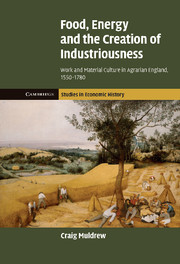 Food, Energy and the Creation of Industriousness
Food, Energy and the Creation of Industriousness Book contents
- Frontmatter
- Contents
- List of figures
- List of tables
- Preface
- Note on measurements and inflation
- List of abbreviations
- 1 Introduction
- 2 What did labourers eat?
- 3 Calories consumed by labourers
- 4 Labourers' household goods
- 5 Work and household earnings
- 6 Agricultural labour and the industrious revolution
- 7 ‘Honest’ and ‘industrious’ labourers?
- Conclusion
- Bibliography
- Index
- References
2 - What did labourers eat?
Published online by Cambridge University Press: 04 February 2011
- Frontmatter
- Contents
- List of figures
- List of tables
- Preface
- Note on measurements and inflation
- List of abbreviations
- 1 Introduction
- 2 What did labourers eat?
- 3 Calories consumed by labourers
- 4 Labourers' household goods
- 5 Work and household earnings
- 6 Agricultural labour and the industrious revolution
- 7 ‘Honest’ and ‘industrious’ labourers?
- Conclusion
- Bibliography
- Index
- References
Summary
Beef the best of which is English bred and fed … is hard of conction [digestion], thick, flesh, it doth not easily pass through the Veins … the frequent use thereof causeth dry and melancholly humours, without exercise and labour of body, especially if it be old Cow Beef or Oxe Beef, that with labour and much working hath contracted drynes and hardness of Flesh … above all meats it is most profitable for laborious people … and gives much strength where it is concocted by labour.'
John Archer, Every Man His Own Doctor, 1671Though never so much a good huswife doth care,
That such as doe labour have husbandlie fare.
Yet feed them and cram them til purse doe lack chinke,
No spoone meat, no bellifull, labourers thinke.
Thomas Tusser, Five Hundred Points of Good Husbandry, 1573It makes sense to begin any discussion of labouring families' standard of living with food, since it formed the greatest part of their expenditure. Food generally comprised up to 70–75 per cent of a pauper or labouring family's yearly expenditure. In the mid-eighteenth century, for instance, food for a very poor family of five from Berkshire would have cost between £9 and £13 a year, and between £24 and £43 for a well-employed family of nine people. In contrast the median value of the household goods listed in labourers' probate inventories from the eighteenth century was only £9 12s, and the value of their farm equipment and stock only £3.
- Type
- Chapter
- Information
- Food, Energy and the Creation of IndustriousnessWork and Material Culture in Agrarian England, 1550–1780, pp. 29 - 116Publisher: Cambridge University PressPrint publication year: 2011
